Nairobi treatmentpublished at 16:28 BST 2 April 2015
Some patients who were airlifted from Garissa have now arrived for treatment as Kenyatta National Hospital in the capital, Nairobi.
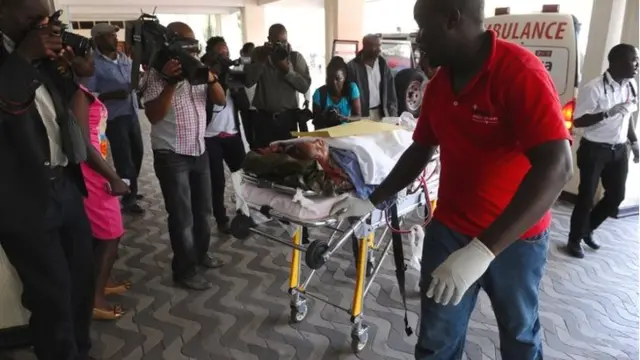 Image source, AP
Image source, APAl-Shabab gunmen storm Kenyan university
At least 70 dead and 79 injured
Unknown number of hostages seized
500 students rescued
Garissa university, 150km from Somali border, sealed off
Lucy Fleming, Clare Spencer and Farouk Chothia
Some patients who were airlifted from Garissa have now arrived for treatment as Kenyatta National Hospital in the capital, Nairobi.
 Image source, AP
Image source, APThe head of the African Union mission in Somalia says he has been "shaken" by the attack in Garissa.
"If you attack a military, it's an equal battle, but if you go after students, who are learning, who are preparing for the future of Africa, it's different. Al-Shabab has no accountability... Because of who they have targeted today - I'm a father myself - I am shaken," Maman Sidikou told BBC Focus On Africa's James Copnall, external.
Kenya's Ministry of Interior tweets, external: "#GarissaAttack update: Two terrorists have been neutralised in the ongoing operation. Security agencies intensify rescue operation."
Ian Hughes
BBC Sport
Morocco have won their appeal against their bans from the 2017 and 2019 Africa Cup of Nations tournaments. The Court of Arbitration for Sport has overturned the ruling which was made by the Confederation of African Football after Morocco did not host the 2015 finals.
The BBC's Bashkas Jugsooda'ay will be live on Focus on Africa at 15:00 GMT with the latest from Garissa and the ongoing siege as the programme tries to establish how many students have been taken hostage at the university campus.
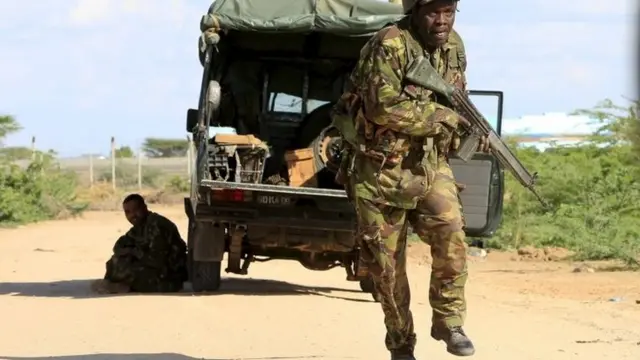 Image source, Reuters
Image source, Reuters Catherine Byaruhanga
Catherine Byaruhanga
BBC, Uganda
A memorial service for Ugandan prosecutor Joan Kagezi, who was shot dead on Monday evening, has taken place in the capital, Kampala. The church was packed with family, friends and government officials. Ms Kagezi was killed by gunmen on a motorbike in a suburb of Kampala on the eve of the trial of 13 men accused of taking part in the 2010 bombings by al-Shabab in Kampala. She was also handling cases on the killing of Muslim clerics.
Commenters on BBC Africa's Facebook page, external have reacted with a mixture of sadness and anger to the attacks in Garissa. One of our most popular posts shows people in the town donating blood at a makeshift facility near the hospital. A commenter described it as "the real Kenya". Meanwhile, some users have suggested that Kenya should withdraw its troops from Somalia to help improve security within Kenya.
Kenya's ministry of interior has raised the reward for the alleged mastermind of the attack to about $216,000 and tweets, external this appeal:
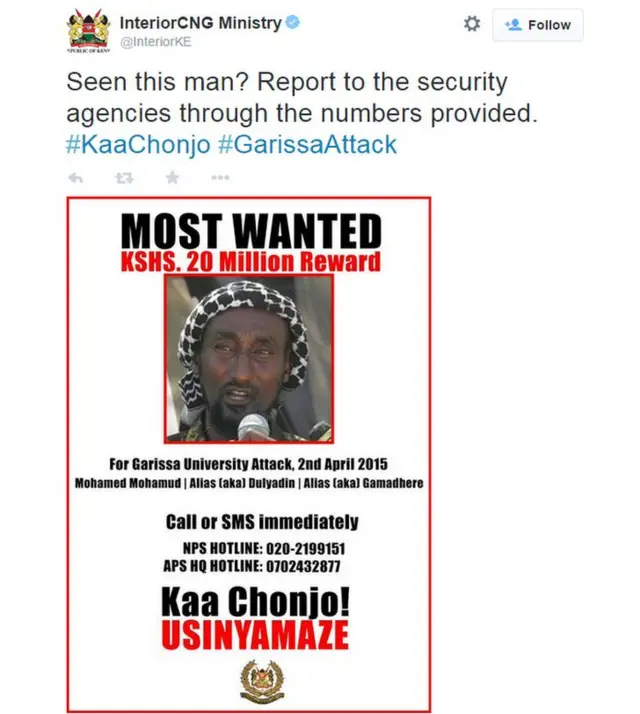 Image source, Ministry of Interior, Kenya
Image source, Ministry of Interior, KenyaWe've got more details on the man the Kenyan government calls the mastermind of the Garissa University College attack.
A BBC Somali Service reporter says that Mohamed Kuno was a headmaster at a madrassa, or Islamic school, in Garissa before he quit in 2007 to join the now-defunct Union of Islamic Courts (UIC) Somalia.
When the UIC split, Mr Kuno joined al-Shabab and became a high-ranking official. Recently he has been involved in running al-Shabab's activities in Kenya. He goes by the nickname "Dulyadeyn", which in Somali means the long-armed one.
The Kenya government has named Mohamed Kuno as the mastermind of the Garissa University College attack.
Kenya's Cabinet Secretary for Internal Security Joseph Nkaiserry placed a $53,000 (£35,700) bounty on Mr Kuno.
Elsewhere in Africa, Sierra Leone, Liberia and Guinea area still dealing with the Ebola outbreak - and you can ask questions about the safest way to bury people killed by the illness later today.
Red Cross's Amanda McClelland will be on the BBC Ebola Facebook page, external from 1600-1700 GMT.
The charity carried out more than 15,000 burials in the three West African states during the current outbreak.
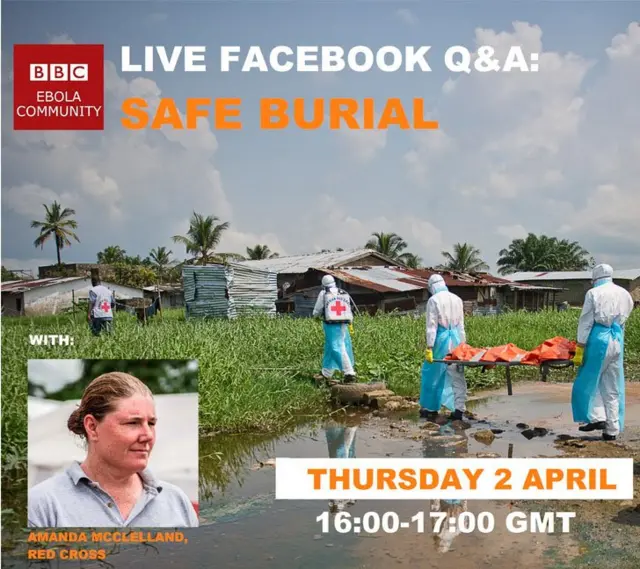
Ruth Nesoba
BBC Africa, Nairobi
tweets, external: "Situation ongoing, small arms fire still being exchanged between militants inside the building and security forces outside. #GarissaAttack"
Kenya's National Disaster Operation Centre tweets, external:
"All staff of the Garissa University College have been accounted for and are helping with the tracking of students."
Catch up on the Kenyan university siege in less than 15 seconds with this BBC News Instagram video, external.
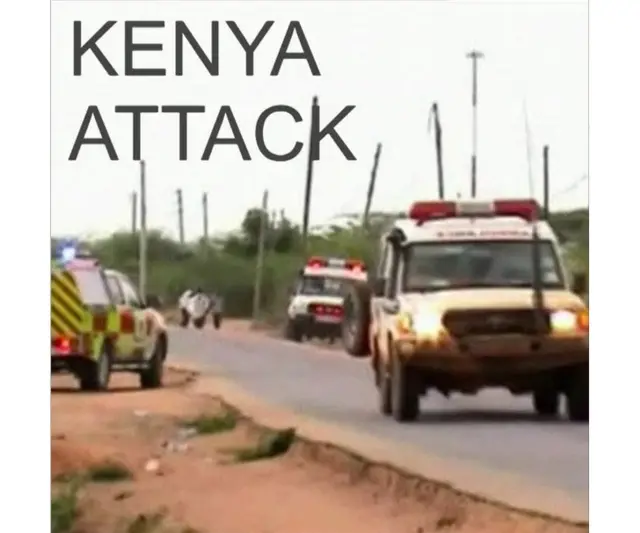
President Kenyatta also said that he had ordered the head of police to "ensure that the 10,000 recruits whose enrolment is pending, promptly report for training at the Kenya Police College".
"We have suffered unnecessarily due to shortage of security personnel. Kenya badly needs additional officers, and I will not keep the nation waiting."
Kenya's President Uhuru Kenyatta has just released a statement, external about the siege, saying "terrorists attacked Garissa University College killed and wounded several people and have taken others hostage".
He extended his condolences "to the families of those who have perished" and said the government had undertaken the "appropriate deployment".
"I also urge Kenyans to stay calm as we resolve this matter, and to provide the authorities with any information they may have in connection with any threats to our security."
Malcolm Webb, a correspondent for al-Jazeera English TV, tweets, external "#Kenyan army tank drives towards #Garissa University. Gunfire, hostages still inside".
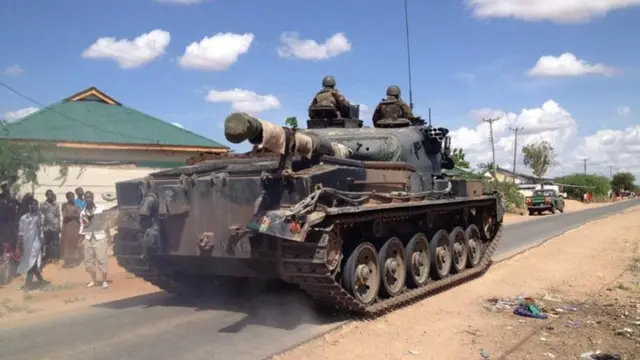 Image source, Malcolm Webb
Image source, Malcolm WebbKenyan-based journalist Hannah McNeish has just spoken to Abdikadir Sugow, the spokesman for Garissa's governor.
She tweets, external that he says the "militia are still on top of the roof. They're gathering there." Mr Sugow said they want to have an "aerial view" of security forces below and there is intermittent gunfire.
From witness statements it is not clear whether the attackers are wearing "protective clothing" or "suicide vests", Mr Sugow said.
Kenyan journalist Dennis Okari, who is at the site of the Garissa University College, tweets, external: "The gunmen are holed up inside the upper hostel section. I can hear gunfire from the other end @ntvkenya".
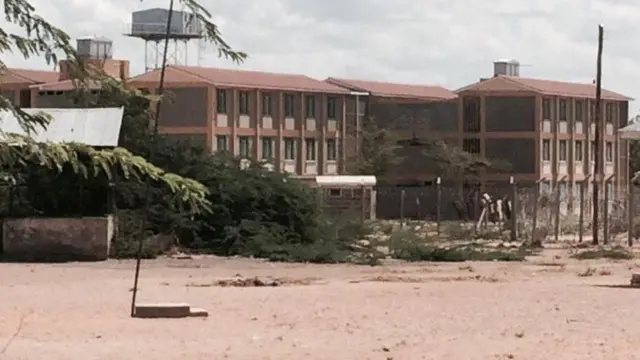 Image source, Dennis Okari
Image source, Dennis Okari Anne Soy
Anne Soy
BBC Africa, en route to Garissa
There have been several recent al-Shabab attacks in north-eastern Kenya - and as in the Westgate mall siege of 2013 - Muslims and non-Muslims have been separated.
A survivor of a bus that was attacked in November told the BBC that the militants asked passengers to recite from the Koran - those who could not quote from the Muslim religious text were killed.
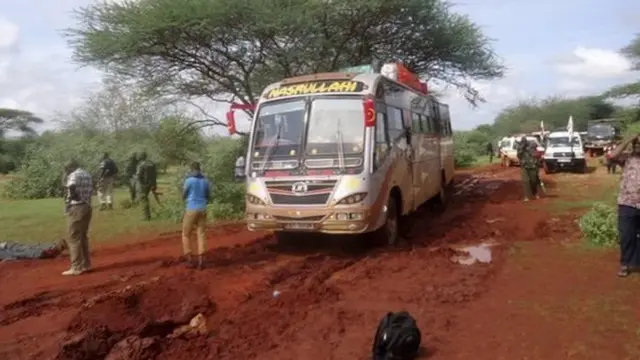 Image source, AP
Image source, APTwenty-eight people died when a bus was hijacked by al-Shabab militants in November
When al-Shabab called the BBC earlier, its spokesman said the group was behind the attack on Garissa University College because it considers it a non-Muslim institution on Muslim ground.